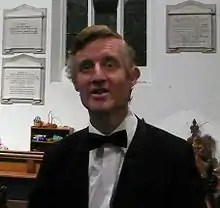Simon Peyton Jones
Simon Peyton Jones FRS MAE[4] (born 18 January 1958) is a British computer scientist who researches the implementation and applications of functional programming languages, particularly lazy functional programming. [5][2]
Simon Peyton Jones | |
|---|---|
 Simon Peyton Jones at the Royal Society admissions day in London in 2016 | |
| Born | 18 January 1958 |
| Citizenship | British |
| Alma mater | University of Cambridge |
| Known for | Glasgow Haskell Compiler, C-- |
| Awards |
|
| Scientific career | |
| Fields | |
| Institutions |
|
| Website | research |
Education

Peyton Jones graduated from Trinity College, Cambridge in 1980[6] and went on to complete the Cambridge Diploma in Computer Science.[7]
Career and research
Peyton Jones worked in industry for two years before serving as a lecturer at University College London and, from 1990 to 1998, as a professor at the University of Glasgow.[6] Since 1998 he has worked as a researcher at Microsoft Research in Cambridge, England.[6][8][9]
He is a major contributor to the design of the Haskell programming language,[10] and a lead developer of the Glasgow Haskell Compiler (GHC).[11] He is also co-creator of the C-- programming language, designed for intermediate program representation between the language-specific front-end of a compiler and a general-purpose back-end code generator and optimiser. C-- is used in GHC.[12][13][14]
He was also a major contributor to the 1999 book Cybernauts Awake,[15] which explored the ethical and spiritual implications of the Internet.
Peyton Jones chairs the Computing At School (CAS) group,[3] an organisation which aims to promote the teaching of computer science at school. Following these efforts, in 2019 he was appointed chair of the newly founded UK National Centre for Computing Education.[16]
Awards and honours
In 2004 he was inducted as a Fellow of the Association for Computing Machinery for contributions to functional programming languages.[1] In 2011 he received membership in the Academia Europaea.[17]
In 2011, he and Simon Marlow were awarded the SIGPLAN Programming Languages Software Award for their work on GHC.[18]
He received an honorary doctorate from the University of Glasgow in 2013[19] and an honorary doctorate from the University of Kent in 2017.[20]
He was elected a Fellow of the Royal Society (FRS) in 2016[4] and a Distinguished Fellow of the British Computer Society (DFBCS) in 2017.
References
- "Prof Simon L Peyton-Jones - Award Winner". Association for Computing Machinery.
- Simon Peyton Jones publications indexed by Google Scholar
- Computing At School: About us
- Anon (2016). "Professor Simon Peyton Jones FRS". London: Royal Society. Archived from the original on 29 April 2016. One or more of the preceding sentences incorporates text from the royalsociety.org website where:
“All text published under the heading 'Biography' on Fellow profile pages is available under Creative Commons Attribution 4.0 International License.” --"Royal Society Terms, conditions and policies". Archived from the original on 25 September 2015. Retrieved 9 March 2016.CS1 maint: bot: original URL status unknown (link)
- Simon L. Peyton Jones at DBLP Bibliography Server

- Peyton Jones, Simon. "Simon Peyton-Jones - Microsoft Research". Microsoft Research. Retrieved 6 April 2011.
- Peter Siebel (2009) Coders at Work: Reflections on the Craft of Programming ISBN 1430219483
- Bresnick, Julie (3 July 2001). "GHC developer Simon Peyton Jones on working for, gasp!, Microsoft". Linux.com. Linux.com. Archived from the original on 9 January 2020.
- Peyton Jones, Simon (18 January 2008). "Ancient, but still having fun". haskel@haskel,org.
- Peyton Jones, Simon, ed. (December 2002). "Haskell 98 Language and Libraries - The Revised Report". haskell.org.
- "The GHC Team". 22 June 2006.
- "Native Code Generator (NCG)". The Glasgow Haskell Compiler. Haskell.org. 17 September 2007. Retrieved 4 April 2019.
- Peyton Jones, Simon (1987). The Implementation of Functional Programming Languages. Prentice-Hall. ISBN 0-13-453333-X.
- Peyton Jones, Simon; Lester, David R. (August 1992). Implementing Functional Languages. Prentice-Hall. ISBN 0-13-721952-0.
- Cybernauts Awake!: Ethical and Spiritual Implications of Computers, Information Technology and the Internet. Church House Publishing. 1999. ISBN 978-0-7151-6586-7.
- "Top computer scientist chosen to lead National Centre for Computing Education". UK Department for Education. Retrieved 20 March 2019.
- Academia Europaea List of Membership
- "SIGPLAN Programming Languages Software Award". Galois, Inc. 7 June 2011. Archived from the original on 10 June 2011.
- "Honorary Doctorate for Simon Peyton Jones". University of Glasgow. Retrieved 20 July 2014.
- "Professor Simon Peyton Jones, MA, FACM, FBCS, CEng". University of Kent. Retrieved 14 February 2019.